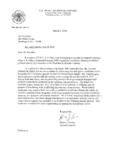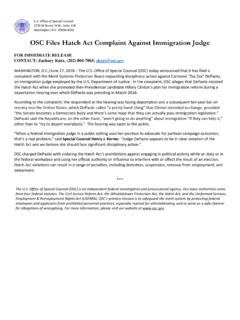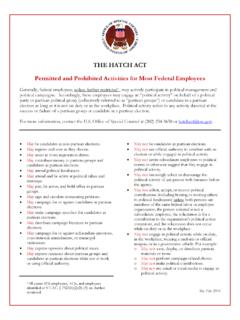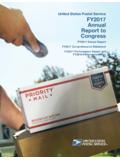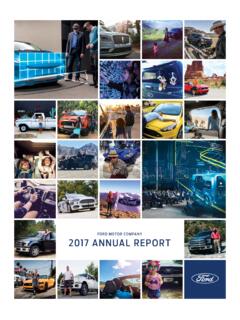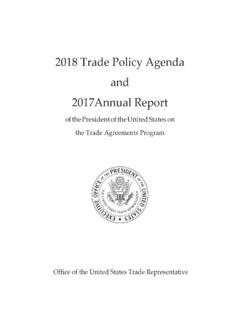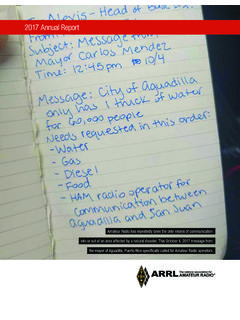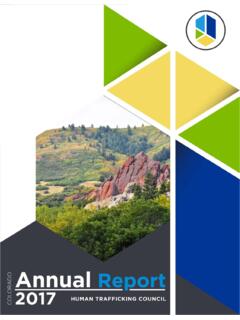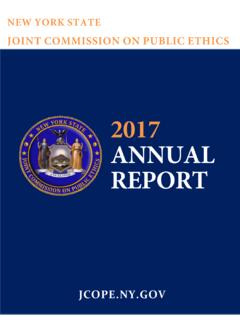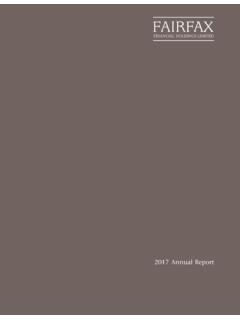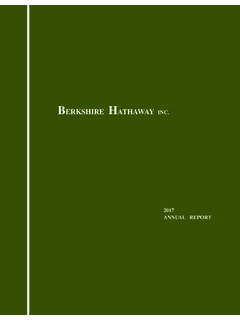Transcription of FISCAL YEAR 2017 - osc.gov
1 annual report TO CONGRESS for FISCAL YEAR 2017 OFFICE OF SPECIAL COUNSEL 1730 M Street, , Suite 218 Washington, 20036-4505 The Honorable Michael R. Pence President of the Senate Washington, 20510 The Honorable Paul D. Ryan Speaker of the House of Representatives Washington, 20515 Dear Mr. President and Mr. Speaker: I respectfully submit the report to Congress for FISCAL year 2017 from the Office of Special Counsel. A copy of this report will also be posted on our website. Sincerely, Henry J. Kerner The Special Counsel OFFICE OF SPECIAL COUNSEL 1730 M Street, , Suite 300 Washington, 20036-4505 TABLE OF CONTENTS The Special Counsel 6 A Message from the Special Counsel 7 Part 1: Introduction to OSC 8 Statutory Background 8 Mission 9 Part 2: Overview of Operations 10 Internal Organization 10 FY 2017 Budget and Staffing 12 FY 2017 Case Activity and Results 12 Part 3.
2 Prohibited Personnel Practice Complaints 16 Summary of Workload, Activity, and Results 16 Receipts and Investigations 16 Performance Highlights 18 Amicus Curiae Briefs 19 Prohibited Personnel Practice Successes 20 Part 4: Whistleblower Disclosures 26 Overview 26 Disclosure Successes 26 Part 5: Hatch Act 32 Overview 32 Advisory Opinions 32 Hatch Act Unit Successes 32 Part 6: USERRA Enforcement Program 35 Overview 35 USERRA Successes 35 Part 7: Diversity, Outreach, & Training 37 Diversity, Outreach, and Training Program 37 annual Survey Program 37 Further Information 38 Prohibited Personnel Practices 38 Whistleblower Disclosures 38 Hatch Act 38 USERRA 39 Diversity, Outreach.
3 And Training Program 39 Office of Special Counsel annual report for FISCAL Year 2017 5 Supporting Tables Table 1 Summary of All OSC Case Activity 13 Table 2 Summary of All Prohibited Personnel Practice Complaints Activity Receipts and Processing 17 Table 3 Summary of All Favorable Actions Prohibited Personnel Practice Complaints 18 Table 4 Summary of Whistleblower Disclosure Activity Receipts and Dispositions 31 Table 5 Summary of Hatch Act Complaint and Advisory Opinion Activity 34 Table 6 Summary of USERRA Referral and Litigation Activity 36 Office of Special Counsel annual report for FISCAL Year 2017 6 THE SPECIAL COUNSEL Carolyn N.
4 Lerner served as Special Counsel from 2011 to 2017 . On June 14, 2017 , President Trump designated Adam Miles, OSC s Deputy Special Counsel for Policy and Congressional Affairs, to serve as Acting Special Counsel, pursuant to the Vacancies Reform Act (5 3345(a)). After serving at the agency for 90 days as Principal Deputy Special Counsel, Tristan Leavitt became Acting Special Counsel on September 16, 2017 . Their terms as Special Counsel encompass the period of coverage for OSC s FISCAL year 2017 annual report . Henry J. Kerner was sworn in to serve as Special Counsel on October 30, 2017 .
5 Office of Special Counsel annual report for FISCAL Year 2017 7 A MESSAGE FROM SPECIAL COUNSEL HENRY J. KERNER It is my pleasure to present the Office of Special Counsel s (OSC) annual report for FISCAL year (FY) 2017 . This report marks the beginning of my leadership tenure at OSC, which has the important mission of protecting Federal workers and holding government accountable. OSC provides a safe channel for Federal employees to report fraud, serious waste, mismanagement and abuse, as well as dangers to public health and safety. The agency safeguards the employment rights of Federal employees and returning members of the uniformed services.
6 Overall, OSC protects the public, stands up for taxpayers, and increases the confidence of the public and the Federal community in their government. Ensuring accountability is a job I do not take lightly, and I will be working diligently within OSC and with the Federal community, Congress, and all stakeholders towards accomplishing this goal. Sincerely, Henry J. Kerner June 12, 2018 Office of Special Counsel annual report for FISCAL Year 2017 8 PART 1 INTRODUCTION TO OSC Statutory Background The Civil Service Reform Act of 1978 (CSRA) established OSC on January 1, 1979.
7 Under the CSRA, OSC operated as an autonomous investigative and prosecutorial arm of the Merit Systems Protection Board (MSPB or Board). Pursuant to the CSRA, OSC: (1) receives and investigates complaints alleging prohibited personnel practices (PPPs); (2) receives and investigates complaints regarding the political activity of Federal employees and covered state and local employees, and provides advisory opinions under the Hatch Act on the political activity of covered Federal, state, and local Government employees; and (3) receives disclosures from Federal whistleblowers about Government wrongdoing.
8 Additionally, OSC, when appropriate, files petitions for corrective and or disciplinary action with the Board in PPP and Hatch Act cases. A decade later, Congress enacted the Whistleblower Protection Act of 1989 (WPA). Under the WPA, OSC became an independent agency within the executive branch, with continued responsibility for the functions described above. The WPA also enhanced protections for employees who allege reprisal for whistleblowing and strengthened OSC s ability to enforce those protections. Congress passed legislation in 1993 that significantly amended the Hatch Act provisions applicable to Federal and District of Columbia Government employees.
9 The 1993 amendments to the Hatch Act did not affect covered state and local Government employees. The following year, Congress enacted the Uniformed Services Employment and Reemployment Rights Act of 1994 (USERRA). USERRA protects the civilian employment and reemployment rights of those who serve or have served in the Armed Forces, including the National Guard and Reserve, and other uniformed services. It prohibits employment discrimination based on past, present, or future military service; requires prompt reinstatement in civilian employment upon return from military service; and prohibits retaliation for exercising USERRA rights.
10 Under USERRA, OSC may seek corrective action for service members whose rights have been violated by Federal agencies ( , where a Federal agency is the civilian employer). OSC s 1994 Reauthorization Act expanded protections for Federal employees and defined new responsibilities for OSC and other Federal agencies. For example, the Reauthorization Act provided that within 240 days after receiving a prohibited personnel practice complaint, OSC should determine whether there are reasonable grounds to believe that such a violation occurred, exists, or that action is to be taken. Also, the Reauthorization Act extended protections to approximately 60,000 employees at the Department of Veterans Affairs (VA), and whistleblower retaliation protections were extended to employees of listed Government corporations.

